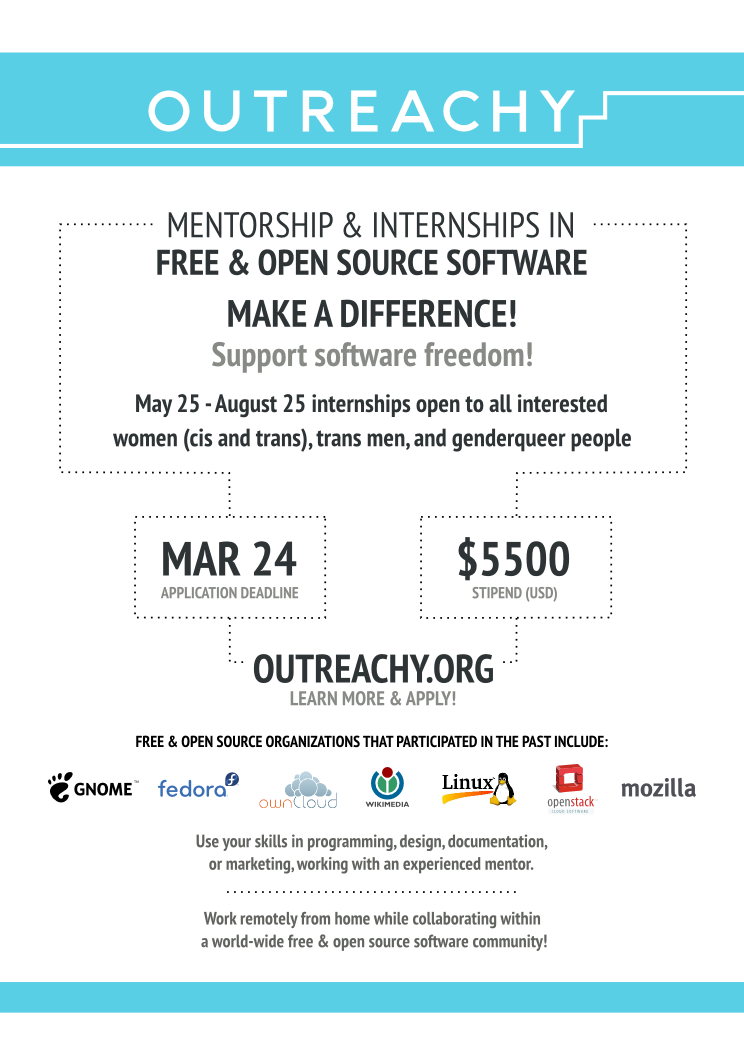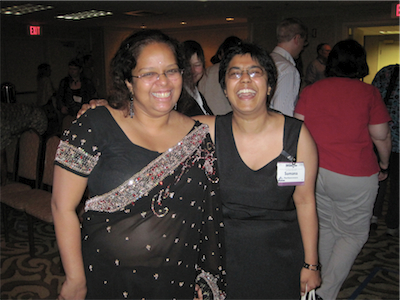# (3) 02 Mar 2015, 03:09PM: Some Books I've Read In The Last Year:
I have read many, many books since I last rounded them up. I may start using LibraryThing or similar to track and recommend things since I demonstrably don't blog about the books often enough to keep up. Future Sumana and others, have some fragmentary, tardy reviews, with more to come.
Zen Cho, Spirits Abroad (short story anthology). Deeply engaging, funny, loving, and heartstring-tugging (I'm reasonably sure that midway through the first story, I burst into tears and called my mom). I appreciate how Cho talks about things I don't understand, uses words I don't know, and helps me keep going even when I'm missing bits that (for instance) Malaysians would grok. She does not do this by explaining or glossing every phrase, in case you (like me) dislike that approach.
Greg Milner, Perfecting Sound Forever: The History of Recorded Music. I picked this up because of Scott Rosenberg's recommendation and give it two thumbs way up. I never took a college-level physics class and I suspect know less than the median US-born person my age about pop music of the 20th century. Milner's exposition gave me the background I needed to understand the ways recording and playback technology affected music, and vice versa, without being condescending. I learned even more about Edison's vengefulness, and I now understand a lot more about the influence of World War II on the music tech industry, about racism in the folk music preservation scene, about how we choose codecs for compression, about the loudness wars and dynamic range, about why we revere or despise particular practices or musicians, about the sexist culture of audiophilia, and about how to (or how not to) get people to switch workflows.
Joanna Russ, The Adventures of Alyx. I don't see as much fiction as I'd like about super-competent women managers. I especially do not see enough fiction about competent women managing incompetent men and causing them to realize, empirically, that she is right and they are wrong. This is the best thing about The Adventures of Alyx.
Molly Gloss, The Dazzle of Day. The very first thing I want to get across is that this is not comfort reading; it includes realistic depictions of sexual assault and its aftermath. I am very glad I read this heartbreaking, nuanced tale of Quakers in space -- Jo Walton gets at the way Gloss depicts people and situations I rarely see in scifi, and as Sue Gardner has mentioned, understanding Quakers helps me understand Wikimedian consensus better -- but it is not gentle.
Rita Mae Brown, Rubyfruit Jungle (reread). I more thoroughly noticed the "make my own stories/films about Us" theme this time. Maybe that's because Leonard and I have been watching so many films, via the Museum of the Moving Image, from decades past. As bad and simplistic and inaccurate as media representation of QUILTBAG people is now, it's better than it was.
Ha Jin, A Good Fall (short story collection). I had previously read his novel Waiting, and in both his short stories and his novels, Ha Jin does a painfully good job of delicately splaying open the interiority of ordinary people navigating modernity. He sets much of A Good Fall in Flushing, in my own county, and many of his characters are Asian or Asian-American, so I got that added touch of familiarity. If I recall correctly, Ha Jin can make me feel empathy for a character who is making bad decisions, which not every author can do!
Lavanya Sankaran, The Hope Factory. I'd previously read Sankaran's short story collection The Red Carpet, which I do recommend. I loved The Hope Factory -- what a Bangalore story, getting the texture of class, gender, and location so right. (I wonder whether the flashback chapter about one protagonist's day laborer past would work as a standalone story; it sure has a Crowning Moment of Awesome that I will remember for a long time.) I honestly do not know whether I should recommend this book to non-Indians or even desis who are not Karnatakan or Kannadiga, whether it will sparkle quite as bright to people who have never been to that particular dosa restaurant, who don't think "wait I think I have relatives in that square mile of Mysore." But if you're looking for an English-language novel set in modern-day Bangalore, spanning rich and poor, family and business and politics, check this out.
Toni Morrison, Beloved -- haven't finished this yet. I picked this up at a moment when I wasn't ready for how deeply sexy it gets, so I paused; I'll be picking it up again sometime.
Kate Griffin, A Madness of Angels. I cannot remember whether I finished this book. I heard about it because people said the protagonist uses an Oyster card as a component in a magical ward. (People on Dreamwidth find this charming and I am no exception!) But A Madness of Angels is about 1% that kind of awesome Terms-Of-Service-based magic, and about 99% moody swirling coats and "I thought I was dead, how did I get resurrected?" and men in fog and GET BACK TO THE END USER LICENSE AGREEMENTS ALREADY! I am much more interested in urban fantasy if someone is committing magical fraud or magically suing someone than if someone is committing magical murder.
Jean M. Converse and Howard Schuman, Conversations at Random: Survey Research as Interviewers See It (reread). I love this super-obscure book, which I picked up used many years ago. It includes many anecdotes about surprises that door-to-door survey-takers have run into. I like these stories for the same reason I end up rereading the case studies and blockquotes from Carol Gilligan's In A Different Voice or Irving Yalom's Love's Executioner.
Ken MacLeod, The Human Front and The Restoration Game. I read these for an upcoming online book club-type event, and am currently reading MacLeod's Newton's Wake for that same project. I enjoyed the two that I've finished: brisk reads, relatable protagonists, Big Reveals, reasonable exposition so you don't have to come into the book already knowing all the Trotsky-related feuds in twentieth-century communism. Either of these would be a reasonable first MacLeod. (I attempted to read his Fall Revolution series by starting with The Star Fraction and bounced off, at least for now, on the "ugh why do I care about these people, giant dream sequence, I do not know enough about communism to grok this" barriers. I have since been advised to try again with a different Fall Revolution book later!)
Atul Gawande, Complications. I liked this and read aloud bits of it to people, especially the bits about teaching and risk, but it does suffer a bit from comparison to Better, which has a throughline. Still good enough to make me daydream about finding myself on some kind of Indian-American Powerhouses panel with Gawande!
Zora Neale Hurston, Their Eyes Were Watching God (reread). I last read this about 15 years ago, for a class, and I'm grateful that I've grown as a reader since then. This time through, I could appreciate Neale Hurston's lush descriptive prose more thoroughly, because now I see what other authors are trying to do when they expend verbiage on hot humid Southern garden scenes. There's an exemplary early passage that connects our protagonist's blossoming sexuality with her new awareness of the sensual world around her and mixes observation of her interior life with trees, flowers, etc. Also, I'd love to talk about class, gender, and sexuality in Their Eyes Were Watching God with other people who have read it recently.
Louise Fitzhugh, Harriet the Spy. I believe I've never read this book before. Just as other adults have said, this book holds up -- when you read as an adult, you see and understand the drawing-room conflicts that Harriet sees but doesn't understand. And yeah, if you are obsessed with discovering everyone else's secrets, other people might hate that and might decide you are not awesome. Hear that, NSA? Perhaps if more people had read Harriet the Spy as kids, we wouldn't have the massive intelligence overreach problems we have now. Neither you nor I have any way of disproving that!
Janet Mock, Redefining Realness. Like many US people, I picked up Redefining Realness because I heard about it, heard it was good, and realized I had not yet read a memoir by a trans person of color. And now I continue this chain of recommendations. Redefining Realness, interestingly, succeeds both as a public service announcement about transphobia and intersectionality and as a memoir about one woman's coming-of-age. I appreciated how Mock interwove her story with statistics and other context.
Ann Leckie, Ancillary Sword. I enjoyed this. The previous book, Ancillary Justice, I enjoyed quite a lot as I was reading it. Ancillary Sword I did not enjoy as much as I was reading it, and then enjoyed a great deal more afterwards, thanks to a great conversation with Jed. Intriguing ideas include: Breq as unreliable narrator, especially regarding other people's emotions, genders, and sexualities. The shift in settings, from spaceship to space station to planet to station to ship, which helps us compare societies that are functional, dysfunctional, and broken. Leckie compare othering, oppression, and possibilities for resistance across urban and plantation settings. The Ancillaryverse as scifi that argues with other scifi; Radchaai as Borg (ancillaries), or as Federation (per the "root beer" and Eddington/Maquis critiques from Deep Space Nine). Justice of Toren as literally the ship who sang (see the comments in Leckie's post here, around the novels' feminist lineage). Danny O'Brien's take on Radchaai beauty standards. What bits of the Radch feel Hindu to me.
Peter Falk, Just One More Thing (reread). I originally read Falk's autobiography before I had gotten into Columbo, and enjoyed taking another look. Fun, funny, wise, a nice collection of heartwarming and offbeat stories, exactly what I wanted as a Columbo fan.
Julie Phillips, James Tiptree, Jr.: The Double Life of Alice Sheldon. I'd been putting this off until I could handle the anguish of it, and I'm glad I did. Julie Phillips's comprehensively heartbreaking biography made me weep and yearn hopelessly for an alternate universe or two. I remember standing in the Shakespeare & Co. south of the UC Berkeley campus, reading "The Screwfly Solution" in an anthology -- maybe I've never gotten over that disturbance. And, like a memento mori, in the spinner rack in my living room, within arm's reach of the sofa, I've placed a copy of Warm Worlds and Otherwise by James Tiptree, Jr., an edition that includes that Silverberg intro where he calls her prose "ineluctably masculine." "So when the human male describes his world he maps its distances from his unspoken natural center of reference, himself," Tiptree wrote. My own experience of being othered, misread, being thought too emotional or too unfeminine or too weak by some man's standards, are far fewer than hers were. But it does bother me that I frequently get misgendered in open source communities. It would be really lovely if I never again needed to say, "I'm a woman; please don't assume everyone you meet in IRC is a man." If I felt like pretending, I would not have to call myself James or Arjun; an abstract avatar, the amount of ASCII swagger I already exhibit, and others' assumptions would do the job for me -- our assumptions, I should say, as I also wonder how many women I am currently misgendering as men.
Billy Fawcett (?), Captain Billy's Whiz-Bang. Leonard or I picked this up basically because it shows up in The Music Man. My favorite joke: "How do you like the Volstead Act?" "Oh, I never did care for vaudeville." Has a tremendous number of sexist or otherwise wince-inducing jokes, some of which depend on stereotypes I don't even know and are thus inexplicable.
# 05 Mar 2015, 04:16PM: The Triumph Of Outreachy:
Right now, y'all can apply to the Free and Open Source Software Outreachy internships, formerly OPW -- the deadline is March 24th. Copy the flyer below to spread the word! And March 24th is also the deadline for your organization to sponsor internships -- if your employer has deep pockets, use this template to ask them for some cash.
As of last month, Outreach Program for Women is now Outreachy, and Outreachy will move from the GNOME Foundation to being a member project of Software Freedom Conservancy on May 1. This step makes sense, as Outreachy serves the entire FLOSS community and SFC is specifically set up to provide financial, legal, and administrative support to member projects, whereas GNOME Foundation's core goal is to advance GNOME. I'm grateful to the GNOME Foundation for launching and supporting OPW as it grew!
Celebrating in detail
Outreachy has now taken several pretty wow steps over the course of its 9-year history (see the original announcement and a 2009 retrospective). This is not complete, but:
Empowering everyone involved
In the end, we got six interns for that round, thanks to WMF's contribution and to money Zhurakhinskaya and Karen Sandler got from Google's Open Source Programs Office. Wikimedia has kept on mentoring via OPW/Outreachy, several have stuck around as volunteers, and WMF has hired at least four alumnae as contractors or employees. Outreachy works to help recruit and retain technical contributors, who have more diverse perspectives, more than the event-based or publicity-only initiatives we'd tried before.
OPW helps oppressed people do things they didn't think they could do -- and thank you Outreachy for helping WMF do something we didn't know we could do. :)
Congratulations! And here's video of "The Outreach Program for Women: what works & what's next", a talk that Liz Henry and I gave last year at Open Source Bridge.
 When I saw, in mid-2012, that OPW had included a non-GNOME project, and that OPW had succeeded in getting the percentage of women at GNOME's yearly conference from ~4% (2009) to ~17% (2012), I decided I wanted Wikimedia Foundation to participate. I sought Zhurakhinskaya out at that year's Google Summer of Code Mentor Summit, my boss in tow. Zhurakhinskaya was already looking for me. We instantly agreed that WMF should participate. My boss, Rob Lanphier, trusted my judgement and gave me the budget to fund multiple interns. Zhurakhinskaya helped us decide to expand our contribution.
When I saw, in mid-2012, that OPW had included a non-GNOME project, and that OPW had succeeded in getting the percentage of women at GNOME's yearly conference from ~4% (2009) to ~17% (2012), I decided I wanted Wikimedia Foundation to participate. I sought Zhurakhinskaya out at that year's Google Summer of Code Mentor Summit, my boss in tow. Zhurakhinskaya was already looking for me. We instantly agreed that WMF should participate. My boss, Rob Lanphier, trusted my judgement and gave me the budget to fund multiple interns. Zhurakhinskaya helped us decide to expand our contribution.

 Some of my best WisCon memories are of really funny panels (I enjoyed serving on the
Some of my best WisCon memories are of really funny panels (I enjoyed serving on the 
 To you, what are the manners surrounding giving and receiving gifts?
To you, what are the manners surrounding giving and receiving gifts?
